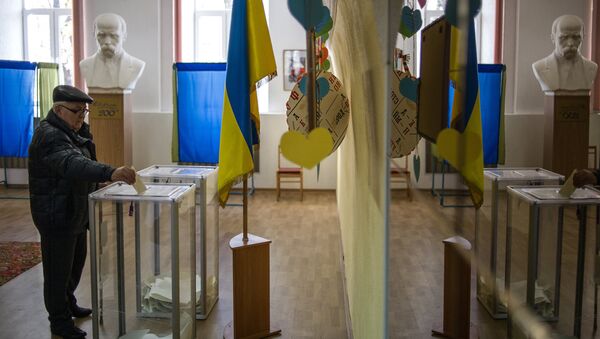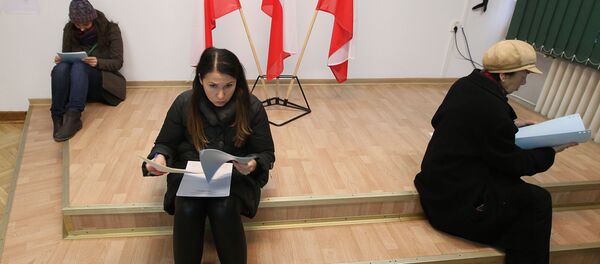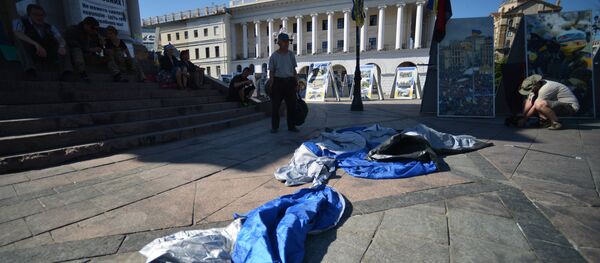In his analysis, published Saturday by Lenta.ru, Vasilyev, a former member of Ukraine's parliament from the eastern Ukrainian region of Donetsk, noted that as attempts by the president to use national parties to consolidate support in the regions fail, local forces, including regional political heavyweights, anti-Kiev regionalists and candidates belonging to local oligarchs are set to win seats in cities and in regional legislatures.
As a result, Sunday's elections will demonstrate just how far centrifugal forces have advanced since parliamentary elections last fall, creating a situation where instead of the traditionally expected west-center-east divide, Ukraine could turn into a quilt-like patchwork of conflicting power groups, many of them resistant to Kiev's control. This, in Vasilyev's view, will ultimately lead either to Kiev acceding to federalization, or to the country's further destabilization and breakup.
Despite Poroshenko's attempt to pass himself off as a unifier, looking for support from all the country's regions in equal measure, Vasilyev suggests that in fact, his party, "the Poroshenko Bloc, is turning into a typical regional project, with support concentrated in central Ukraine, and having little chance for victory anywhere else."
Furthermore, Vasilyev explains that things look even worse for pro-presidential forces in western Ukraine and the country's southeast. "For example, in the local elections taking place in Lviv and Chernivtsi, representatives from Prime Minister Arseniy Yatsenyuk's People's Front are looking to compete with the Poroshenko Bloc, despite promises to abandon the race. This works only to disorient the pro-government electorate."
As for Kharkiv and Dnipropetrovsk, Ukraine's second and third largest cities, respectively, the analyst points out that "the Poroshenko Bloc is giving them up entirely, without any struggle. The only exception in the country's southeast is Odessa. There presidential protégé Mikheil Saakashvili is on the case, managing to force several local political heavyweights to drop out of local races. But even these measures may only work to give pro-presidential forces access to the second round." With that said, it's even possible that the unyielding mayor of Odessa, former Party of Regions politician Gennady Truhanov, may still win in the first round.
National Opposition Parties Not Doing Much Better
Despite the political advantage of a deteriorating socio-economic situation, which can easily be blamed on corruption and government incompetence, Vasilyev notes that none of Poroshenko's major national opposition party opponents seem to be doing much better against local political forces.
This includes Oleh Lyashko's Radical Party, which seems to have little chance of making political inroads in any of the country's major races for city council or regional assembly. It also includes Yulia Tymoshenko's Fatherland Party. "Fatherland's supporters will try and hold on to the mayoral seats in Sumy and Zhytomyr, and to form small fractions in city councils in Kiev and in her native Dnipropetrovsk, but that's about it," the analyst notes.
As for the Opposition Bloc, consisting of representatives from the disbanded Yanukovych-aligned Party of Regions, Vasilyev explains that despite being expected to make a strong showing in the country's southeast, "up to this point, they have made little tangible progress. Among the large cities, only in the industrial center of Mariupol and Krivoy Rog are candidates from the Opposition Bloc clearly in the lead, and only owing to oligarch Rinat Akhmetov's support. Squeezed out of his fiefdom in Donetsk by a popular uprising, he is now attempting to maintain political influence in the areas home to his assets. Meanwhile, key southeastern centers including Odessa and Kharkiv do not even have candidates from the Opposition Bloc."
Regionalist Candidates Lead the Pack
With virtually all the large national parties expected to make a poor showing, Vasilyev suggests that 'regionalist' elites have taken advantage of the weakening center, creating a series of local projects aimed at broadening their autonomy.
The analyst explains that "although regional parties are not provided for under Ukrainian law, in reality more and more emerge every year. The law can be gotten around rather easily: local oligarchs purchase the founding documents of one of the previously registered political parties (and there are over 200 of them) and provide it with the necessary political and economic assets only in their home bases. In the rest of the country, such parties exist only on paper."
The analyst points out that today, "politicians from a variety of purely local projects are leading or seriously competing with national parliamentary parties across virtually the entire country."
Vasilyev recalls that division along regional lines "is not something new for Ukraine, with the country divided in its recent history into the canonical west, center and southwest. However, now the situation has changed, and the country is dividing even further (for now, only in the electoral sense) into individual pieces controlled by local interests –in the best case, by region, in the worst –by individual city."
Vasilyev notes that "if before these elections, Kiev controlled the situation in the regions, at least in the legal sense, now, in the case of victory by purely local forces following the elections, some regions may attempt to demonstrate their power before the central authorities, for example, by trying to redistribute tax revenues in the aim of hanging on to funds for the local budget."
"Such an attempt has been made in the past, with members of the Zaporizhia city council asking Poroshenko for special status. At that time, the president refused the regional leaders, stressing that there would be no federalization. But on Sunday the situation may change…with the local component in the system of regional power increasing dramatically, allowing regional deputies and mayors to ignore the orders of the president outright. And then Kiev will either have to adapt to the status quo (i.e. to change the status of regions under the constitution) or prepare for the loss of a unitary Ukraine."





